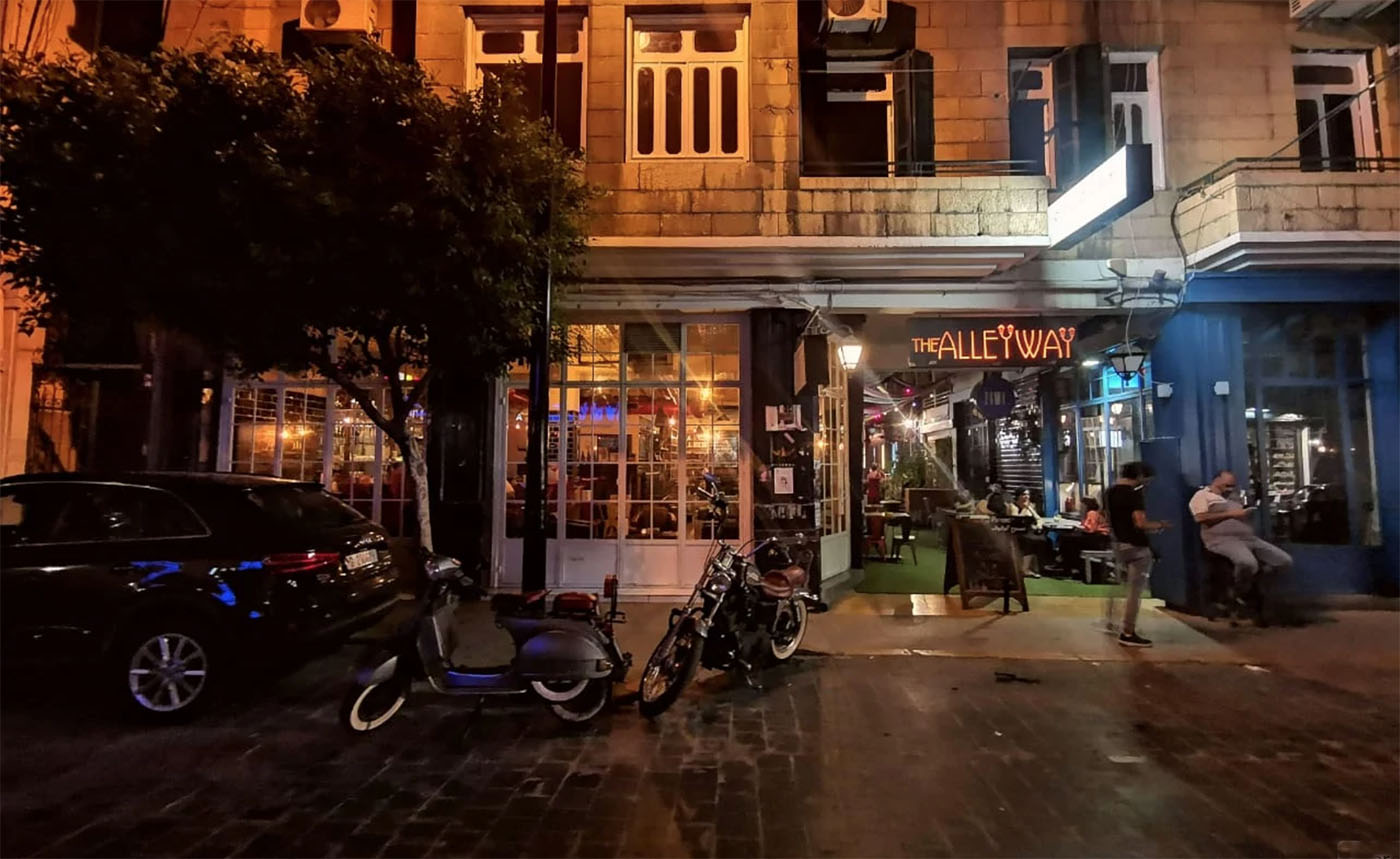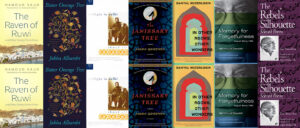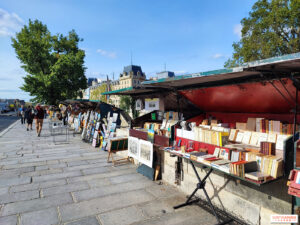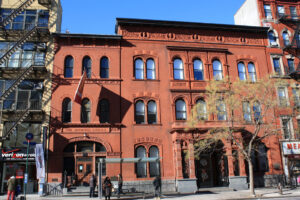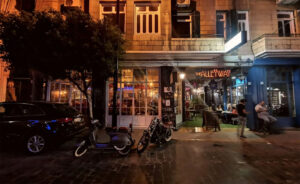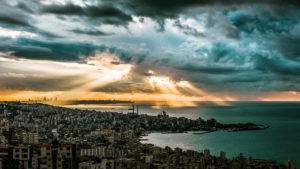These days bookshop owners in Beirut are doing whatever necessary to stay afloat — and despite repeated political and economic crises, Beirutis continue to buy books.
Justin Olivier Salhani
The photographer Paul Gorra was mid-sentence when his microphone went silent and the screen displaying his photograph went blank. The power had cut for the third time that night (in late May) at Barzakh, a Beirut bookshop and café, during a discussion of Gorra’s work and that of fellow Lebanese photographer Tanya Traboulsi.
Gorra kept speaking, projecting his voice a bit louder to reach the handful of audience members near the back of the café, which is situated at the beginning of the Hamra neighborhood and a floor above what was once the storied Horseshoe Café.
Anyone who’s spent time in Beirut knows that power cuts are a common disruption. Businesses and patrons have learned to adapt to a lack of state-provided electricity, as well as a variety of other shortages. But this ability to adapt, what some callously refer to as resilience or sumud, has been stretched to the limit over the past four years, with Beirut and its inhabitants suffering a litany of disasters.
In 2019, the Lebanese lira began to depreciate in value. Citizens took to the streets to protest and eventually toppled the government of then-Premier Saad al-Hariri. Protests were waning in the early months of 2020 when the outbreak of Covid and the pandemic lockdown killed whatever momentum remained. Then, on August 4, 2020, Beirut was the epicenter of one of history’s largest ever non-nuclear explosions, when its seaport went up in flames due to improperly stored ammonium nitrate. Some 220 people were killed, with thousands injured and hundreds of thousands left homeless, owing to the complete or partial destruction of buildings across much of the city. Today, Lebanon is in the midst of one of the worst economic crises in the world since the mid-19th century. The lira has lost more than 95 percent of its value, despite stabilizing somewhat in the past couple of months.
Among the sectors that have suffered as a result of the economic downturn is a pillar of the intellectual scene: bookshops. The expression “Cairo writes, Beirut publishes, and Baghdad reads” may not be as powerfully relevant as it was in the past century, but the Lebanese capital’s ardor for books has not dissipated. Nevertheless, the past four years have confronted Beirut’s bookshops with an existential challenge.
To meet that challenge, they have adapted through a variety of means, one of which is hosting wide-ranging events to attract new customers and build community. I visited three Beirut bookshops for The Markaz Review to learn about how they bring books and events together, and how they have handled the past four years’ volatility.
“There’ve been a number of phases of crisis over the last four years,” Niamh Fleming-Farrell, co-founder and co-owner of Aaliya’s Books, named after the protagonist of Lebanese American writer Rabih Alameddine’s novel An Unnecessary Woman, explained.
Near the end of 2019, paying suppliers became a challenge, as the exchange rate between the lira and the US dollar began to fluctuate. “Suddenly, ordering books wasn’t easy,” Fleming-Farrell said. “There were delays in delivery.”
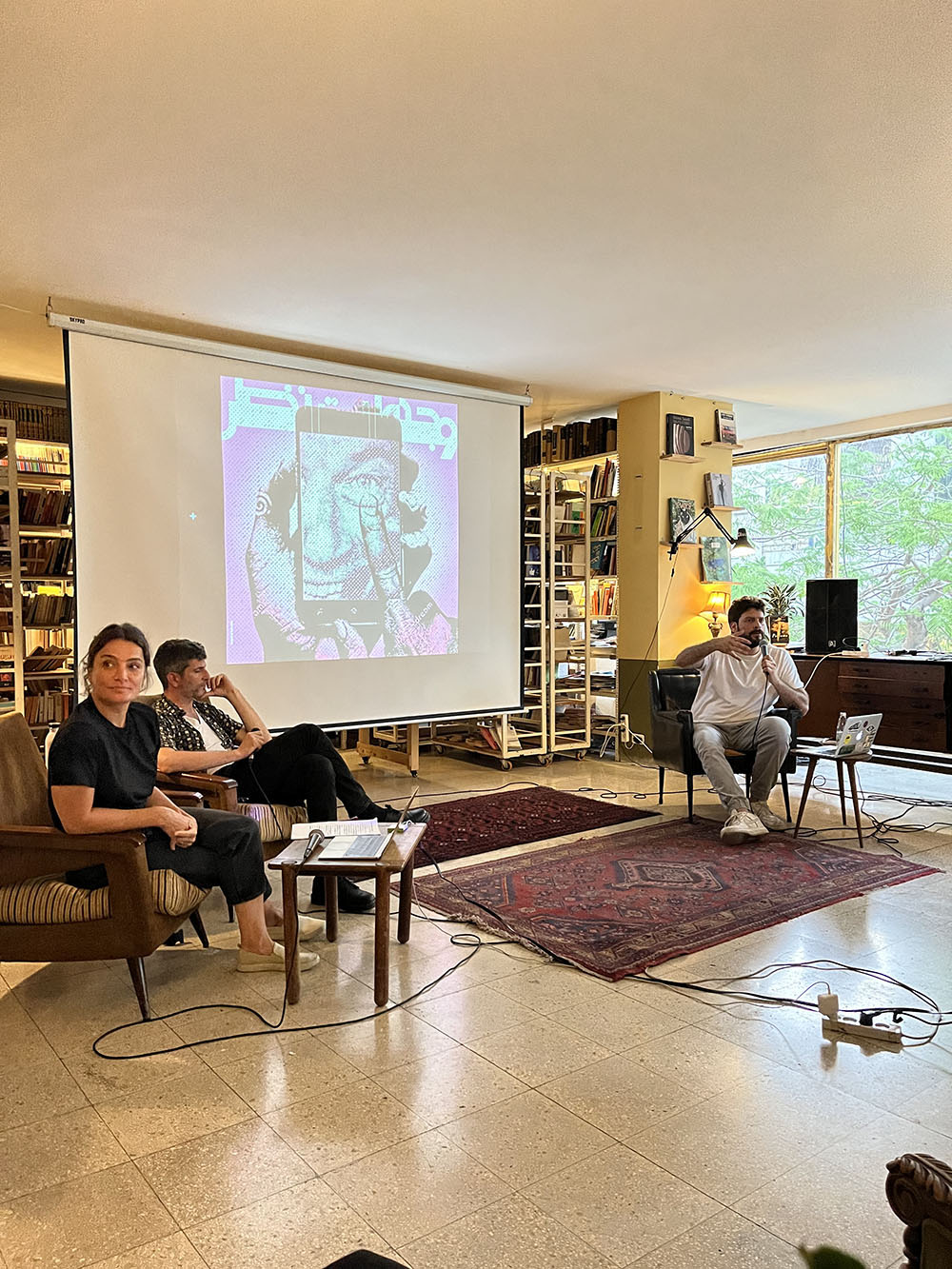
Over the course of the economic crisis, books became less of a priority for Aaliya’s, which shifted its focus to the restaurant and café side of things. Aaliya’s also hosted a number of events. At first, these were book clubs or poetry readings, but eventually they evolved into dances, interviews, and film nights.
In contrast, Halabi Bookshop, located in Beirut’s Qasqas neighborhood, did not change tack as a result of the crisis. Many of Halabi’s books are in Arabic and published locally, according to Karim Halabi, who is part of the family that owns and operates the bookshop. This makes them affordable. The establishment, located just outside the Shatila Palestinian refugee camp, is quite small, with narrow walkways between shelves of books in Arabic, English, and French. Events were once a central part of its identity as well, though everything was related to books: storytelling for children and adults, book clubs, tea parties, and special events during Ramadan such as the hosting of a hakawati — a traditional Arab storyteller.
“We would move the bookshelves and put stools and host 40 people inside,” Halabi said. When I visited the shop, it became crowded if more than half a dozen people came in.
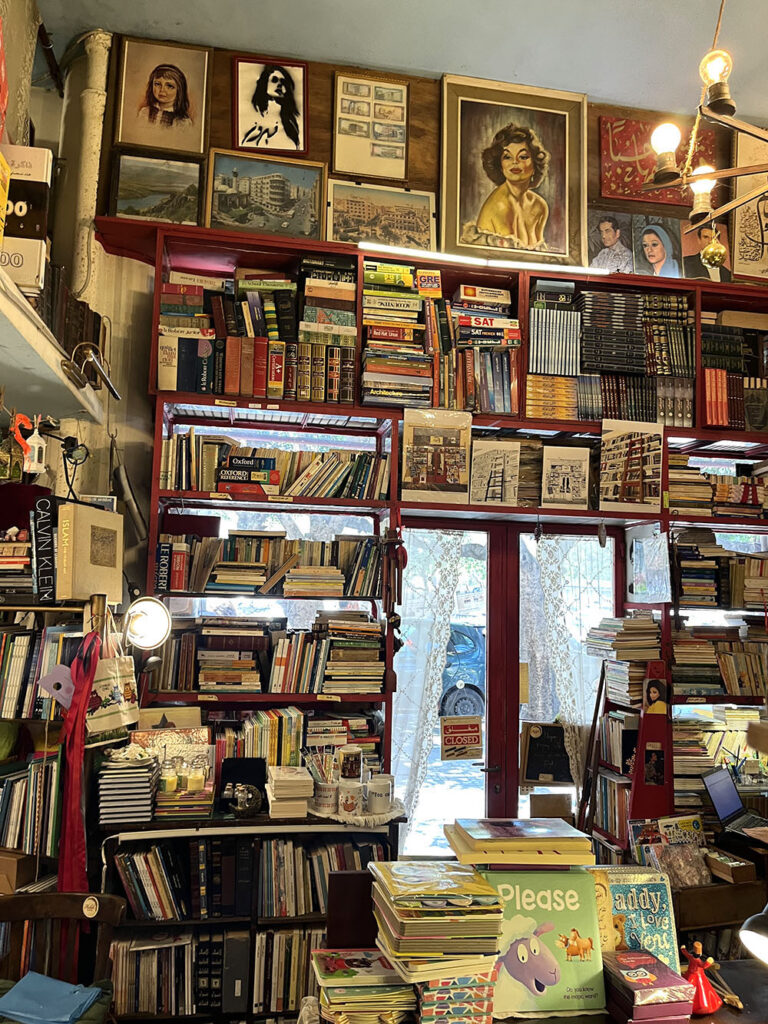
At Barzakh, a bookshop that also has a café, events are seen as a means of expressing the establishment’s alternative identity.
“This is a space for everything,” Khodr Issa, Barzakh’s manager, said. Barzakh regularly holds film screenings and talks with photographers, but has also held yoga, tango, jazz, and blues nights, as well as a range of other events.
According to Issa, Barzakh makes most of its money from food and coffee sales, though books are a crucial part of its business. The establishment has 14,000 to 15,000 books if its archive and storage are included in the count.
Each of the bookshop owners or managers said the economic crisis brought doubt and difficulties for their staff.
“We paid our staff in lira as long as possible,” Fleming-Farrell said. “We felt if everyone refuses to engage with the black market it might not take hold.” But in 2020 it became apparent the black market was here to stay, and Aaliya’s began paying its staff in dollars, so that they could avoid the stress of a constantly depreciating salary. Still, paying suppliers was difficult, and various expenses, such as electricity and fuel, were making life difficult.
“There was no consistent crisis management,” Fleming-Farrell added. “We were feeling our own way.”
Then, in March 2020, the Covid forced lockdowns around the world, including Lebanon. Already struggling businesses were forced to close for an indeterminate period, with some closing forever.
The pandemic ended events for Halabi Bookshop. Luckily, however, its customers still wanted to read. There wasn’t much else to do, and the comparatively cheaper cost of acquiring Arabic books, particularly those published in Lebanon, meant that they could be sold at a reasonable price ($3 to $15 on average). As a result, sales stayed healthy.
Aaliya’s found other ways to survive. It started selling books online and sold wine via delivery.
Shops reopened in May 2020, but many customers still felt uneasy about resuming regular life. And just three months later, the August 4th port explosion added another challenge to the mix.
Aaliya’s is in the heart of Gemmayze, directly behind the port where the explosion took place. “Our metal frames caved in,” Fleming-Farrell said. “Inside was not as bad. The bar was still intact, but still it was months of repair and work, plus the neighborhood was in pieces.”
Rebuilding was difficult financially and emotionally, which came on top of the personal and communal trauma experienced by those who lived through the explosion. “There was no future visibility,” Fleming-Farrell said. “We rebuilt, but we had less info when we reopened than in 2016. We didn’t know salaries or rent, what our revenue would be, or how much customs would be. There were more unknowns.”
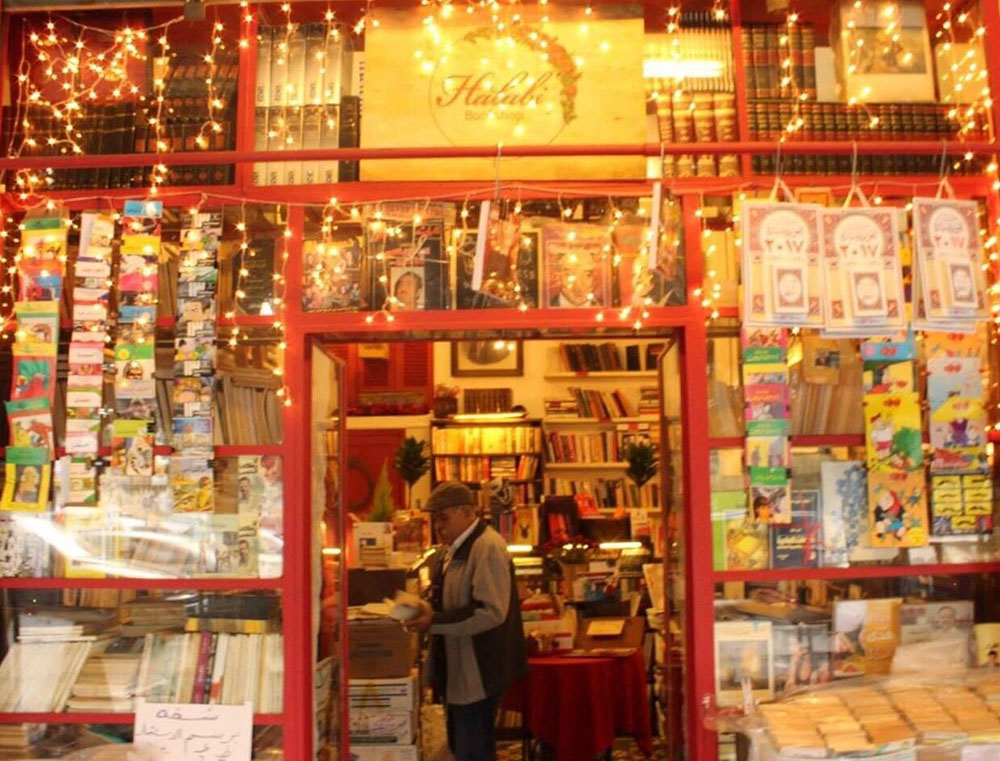
Aaliya’s operated month to month. Then, in 2021, there was the fuel crisis, which caused generator bills to soar. Aaliya’s briefly closed. Since then, the currency has continued to depreciate. At one point, it hit 143,000 liras to the dollar. In recent months, however, the lira seems to have stabilized somewhat, remaining at around 93,000 to the greenback.
All the bookshops’ people say they feel they’ve turned a corner. But there are still struggles ahead. “The supply chain improved and the price of things stabilized, but it is still frustrating,” Fleming-Farrell said. “There are pressures. Salaries are never enough because, month to month, the cost of living rises.”
Generator pricing is also an issue. “It’s regulated in writing, but not in reality,” she said.
“Electricity is killing us,” was how Barzakh’s Issa put it.
Today, book sales have picked up. Fleming-Farrell and Issa both say this began during the holiday season in late 2022. There was the assumption that it might be a temporary bump caused by many Lebanese visiting from abroad. But it seems to have carried on into the spring months, when these interviews took place.
At any rate, events are still very much on the agenda. For its part, Halabi has started hosting them again. And Barzakh recently held a series of film screenings and lectures curated by the researcher and academic Ali Jaber. As for Aaliya’s, it has an event almost every night of the week, including live music, book club discussions, and dancing. It also hosts a weekly live recording of the Beirut Banyan, a podcast on Lebanese politics by Ronnie Chatah.
Chatah points out that spaces such as Aaaliya’s have been used for the exchange of ideas for years. He cited T-Marbouta (still in operation) and Dar Bistro & Books (still open as a café, despite the bookshop having been shuttered) as examples.
“[Such spaces] reflect the cosmopolitan nature of the city and the cultural expression that comes with it,” Chatah said.
And while events have become an important part of the identity of many bookshops, the latter’s primary purpose, acquiring and selling books, is unlikely to fade in the near future. If anything, these bookshops are pressing forward with a certain optimism. Barzakh recently opened its archive to the public. It includes books that are nearly a century old. And, with sales having improved, Aaliya’s has restocked its bookshelves.
As Fleming-Farrell said, books have been around for a very long time. “They’re not gonna disappear. There is always a demand.”



